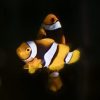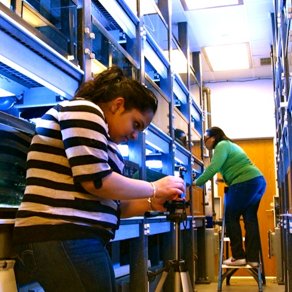Enhance Infrastructure for Research and Education
Rearing Clown Anemonefish for the Community In 2010, we established a captive breeding population of the clown anemonefish Amphiprion percula. These fish have become model systems for social evolution and population connectivity in the sea, and some of their traits, e.g., strategic growth regulation and extraordinary life spans, may be of interest to the medical community. Excitingly, number of high quality genomic (1) and transcriptomic (2) resources are emerging for this species. From 2020, we will be able to provide clown anemonefish, larval rearing and broodstock maintenance protocols to the community. Please contact us for further information.
In 2010, we established a captive breeding population of the clown anemonefish Amphiprion percula. These fish have become model systems for social evolution and population connectivity in the sea, and some of their traits, e.g., strategic growth regulation and extraordinary life spans, may be of interest to the medical community. Excitingly, number of high quality genomic (1) and transcriptomic (2) resources are emerging for this species. From 2020, we will be able to provide clown anemonefish, larval rearing and broodstock maintenance protocols to the community. Please contact us for further information.
Spearheading the Development of Marine Aquarium Science at BU  The BU Marine Program and Department of Biology have multi-user marine aquarium facilities that are second to none. As Director of the BU Marine Program, working together with our staff, I am spearheading the development of a course in marine aquarium science targeted at freshman and sophomores in marine science and biology. The principal objective of this course will be to provide students with the knowledge and skills that they need to take care of saltwater aquarium systems. This will ensure that we make the most of these facilities for training and research projects of the largest possible number of marine science and biology students.
The BU Marine Program and Department of Biology have multi-user marine aquarium facilities that are second to none. As Director of the BU Marine Program, working together with our staff, I am spearheading the development of a course in marine aquarium science targeted at freshman and sophomores in marine science and biology. The principal objective of this course will be to provide students with the knowledge and skills that they need to take care of saltwater aquarium systems. This will ensure that we make the most of these facilities for training and research projects of the largest possible number of marine science and biology students.
Making Data Publicly Available for the Community
 We work with staff at the Biological and Chemical Oceanography Data Management Office to serve data from our research projects online (1, 2, 3). The data sets and supporting documentation are freely available from this database as long as one follows the terms of use. The BCO-DMO encourages anyone interested in using the data to contact us regarding potential collaboration. One successful example of this is our work with Jane Elith, using boosted regression trees to analyze a long-term dataset on clownfish reproduction (1), as part of the NCEAS working group on Machine Learning for the Environment (1).
We work with staff at the Biological and Chemical Oceanography Data Management Office to serve data from our research projects online (1, 2, 3). The data sets and supporting documentation are freely available from this database as long as one follows the terms of use. The BCO-DMO encourages anyone interested in using the data to contact us regarding potential collaboration. One successful example of this is our work with Jane Elith, using boosted regression trees to analyze a long-term dataset on clownfish reproduction (1), as part of the NCEAS working group on Machine Learning for the Environment (1).